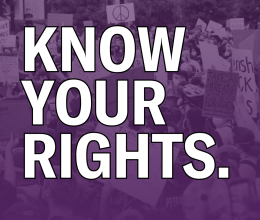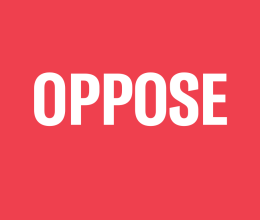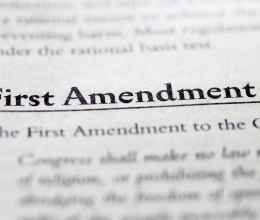In August 2023, former President Donald Trump was indicted in federal court in the District of Columbia on criminal charges related to his efforts to overturn the results of the 2020 Presidential election. The indictment alleged, among other things, that Trump conspired to defraud the United States by interfering with the counting and certification of the election results in several states and to obstruct the congressional proceedings to certify the election results on January 6, 2021, when a large group of Trump supporters stormed the U.S. Capitol.
On October 17, 2023, the court hearing the criminal case issued a gag order prohibiting Trump from “making any public statements, or directing others to make any public statements, that target (1) the Special Counsel prosecuting this case or his staff; (2) defense counsel or their staff; (3) any of this court’s staff or other supporting personnel; or (4) any reasonably foreseeable witness or the substance of their testimony.” Trump moved to stay the order pending appeal, and briefing followed.
On October 25, we submitted for filing, jointly with the National ACLU, an amicus brief urging the court to reconsider the gag order. Although much that Trump has said publicly has been patently false and has caused great harm, Trump retains a First Amendment right to speak, and the First Amendment requires that an order restricting the speech of a criminal defendant—whether Trump or anyone else—must be precisely defined and narrowly tailored to protect the impartial administration of justice. In light of this basic principle, we argued that the October 17 order was both too vague and too broad.
The order was too vague because it left the meaning of the key word “target” unclear. This word has many meanings. For instance, one could “target” another with respectful but vigorous political advocacy, or “target” them for physical violence or death. The order failed to specify what it meant by this word, and so an ordinary person in Trump’s shoes couldn’t know what was prohibited by the order and what was permitted.
The order was also too broad, because the order’s prohibition of “target[ing] . . . any reasonably foreseeable witness or the substance of their testimony” effectively barred Trump from addressing whole subjects of discussion. For instance, witness testimony in this case will concern the events of January 6, 2021, the results of the 2020 presidential election, and Trump’s own conduct in relation to both. These topics are key points in the ongoing 2024 presidential campaign, in which Trump is a candidate. Barring any discussion of these entire topics by Trump is unconstitutionally overbroad, because that discussion—particularly in light of how much has already been said publicly about these topics—would not imminently threaten the fairness of Trump’s criminal proceedings. Further, the October 17 order bars criticism of the Special Counsel prosecuting Trump—another subject of great public interest. Thus, the gag order undermines public discussion on matters of public concern that are at the heart of what the First Amendment protects.
These principles are not limited to Trump. When Rep. Harold Ford, Tennessee’s first Black congressman, was prosecuted for bribery in the 1980s, a court imposed a similar gag order and it was rightly struck down on appeal, in order to permit Rep. Ford to opine on subjects of public importance, including the fairness of his prosecution itself. The same First Amendment principles apply to everyone regardless of political party.
Finally, our amicus brief suggested ways in which the court could narrow its order to prohibit speech that is unprotected by the First Amendment and/or that poses an imminent danger to the administration of justice—like speech threatening, harassing, or soliciting others to threaten or harass court staff or witnesses.
That Donald Trump exhibited little regard for the Constitution or the rule of law during his Presidency does not lessen courts’ duty to uphold those foundational principles of a free society. Indeed, in highly charged and closely watched cases like this one, scrupulous observance of the First Amendment is, if anything, especially important.
he district court denied our motion for leave to file our amicus brief, and it issued an order explaining, but not modifying, the gag order. Trump appealed.
After expedited consideration, the D.C. Circuit issued an opinion on December 8 that "agree[d] with the district court that some aspects of Mr. Trump’s public statements pose a significant and imminent threat to the fair and orderly adjudication of the ongoing criminal proceeding, warranting a speech-constraining protective order" but held that the district court's "sweeps in more protected speech than is necessary" and therefore must be narrowed to comport with the First Amendment. The appeals court accordingly vacated the order except insofar as it "prohibits all parties and their counsel from making or directing others to make public statements about known or reasonably foreseeable witnesses concerning their potential participation in the investigation or in this criminal proceeding" and "to the extent it prohibits all parties and their counsel from making or directing others to make public statements about—(1) counsel in the case other than the Special Counsel, (2) members of the court’s staff and counsel’s staffs, or (3) the family members of any counsel or staff member—if those statements are made with the intent to materially interfere with, or to cause others to materially interfere with, counsel’s or staff’s work in this criminal case, or with the knowledge that such interference is highly likely to result."
We are pleased that the appellate court applied a rigorous First Amendment standard to safeguard speech about the judicial process and that it narrowed the gag order to enable the open discussion of matters of great public concern. We think the modified order reflects an appropriate balance of Trump’s free speech rights with the court’s legitimate need to protect the judicial process from a defendant who has demonstrated his eagerness to interfere with it.



